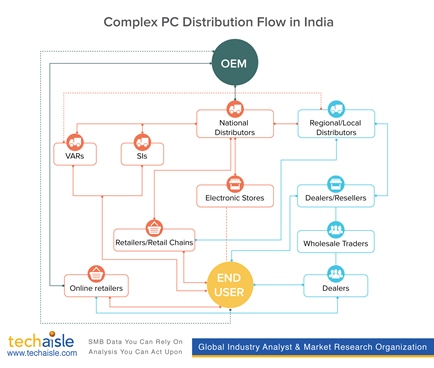This is a two-part blog article. The first part below deals with “SMB IT channel reaching an inflection point”. Second part is on “New wave of SMB channel conflicts in building a cloud practice”.
SMB IT channel has reached an inflection point. In some sense, this statement appears to be just another observation of a recurring phenomenon: the SMB channel is constantly in a state of flux, responding to changes in the underlying industry by adding (or deleting) products and capabilities to its portfolios. The SMB channel’s situation in 2016, though, is different. Changes in the ways that IT is used within SMB organizations, the relationships needed to build solutions addressing these needs, and the skills required to support these usage patterns and solutions are fragmenting the channel into discrete (if overlapping) communities.
Rewind
To put this into perspective, let us rewind a decade, or two, or three. In each case, we see a channel that is reliant upon relationships with customers and suppliers, and which forms the connection between the two groups. Looking first at the customer relationships, the SMB channel organization works with SMB firms in a defined market – generally, a regional market, but in some cases, a market defined by region and industry, and in fewer cases still, a market defined by adoption of a particular type of technology (e.g., a specific type of software – content management, design, etc.) or a specific vendor’s products. The SMB channel firm deals with a tightly-defined contact or set of contacts within the customer organization: in most cases, the IT manager where this role exists, or a senior executive/partner/owner in firms too small to have in-house IT staff. And it provides management services for installed technology, support for users, and analysis and recommendations for new technology.
This position as a “trusted advisor” (or at least, regular supplier) to a defined customer base makes the channel a valuable partner for IT vendors. The vendors can work with the channel partner to introduce new technologies to a target market. The channel benefits by having access to products that shape future analysis/recommendations to customers, extending the channel/end-user connection. The channel also benefits from obtaining margin from the vendor and from vendor investments in channel marketing activities, as well as from a degree of co-investment in skills development. The channel aggregates new vendor offerings to extend existing customer infrastructure, completing the connection between buyers and new products.
For decades, this model worked largely because most new products could be added to most existing infrastructures. IT followed an incremental and relatively homogenous path; companies deployed servers and storage and a set of core financial applications in the back office, PCs and productivity software for individual workers, and upgraded to keep current with interoperability and maintenance requirements. Towards the end of the 1990s, web servers became a core component of this corporate compute portfolio, and firms would occasionally add capabilities (such as IP telephony) in advance of competitors, but like the upgrades and extensions, the progression of new technology was more deliberate than disruptive.
Today
In recent years, IT adoption has become more diffused.

















